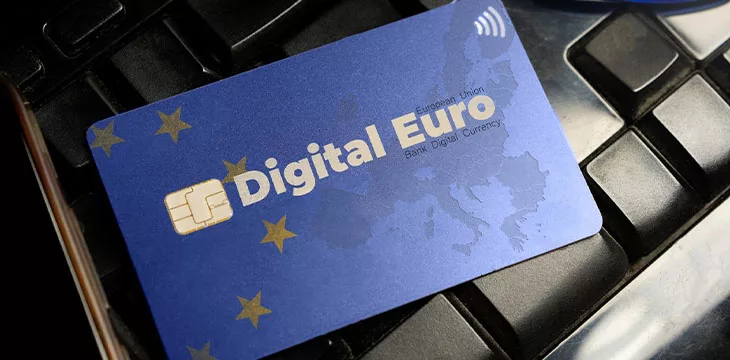|
Getting your Trinity Audio player ready...
|
European Central Bank (ECB) executive board member Fabio Panetta gave a speech on September 4 praising the European Commission’s (EC) proposed digital euro legislation, saying that they “put Europe at the forefront of advanced economies” while ensuring that the financial system does not get eclipsed by private payment providers.
The proposals were published in June as part of the European Commission’s single currency package. Among other things, the legislation would elevate the digital euro to legal tender status, ensuring its acceptance throughout the European Union.
Panetta highlighted four key benefits offered by the digital euro legislation.
First, he praised the legal tender provisions, saying that in addition to giving people the right to have access to and pay with the digital euro, it would “ensure that users can access digital euro at their current bank, with no need to change banks.”
He also highlighted the potential privacy benefits of the digital euro under the proposed legislation, saying that the ECB has suggested that the Eurosystem, the monetary authority of the eurozone, would be unable to see payment details of digital euro users or connect any such payment information to private individuals.
He praised the proposal for balancing competing priorities in setting the pricing parameters of the digital euro. Under the legislation, transactions would be free of charge for basic payments by individuals, but payment service providers would be able to apply ‘proportional’ merchant service charges and inter-service provider transactions.
Lastly, Panetta said the proposal recognizes the ECB’s need to maintain the equilibrium between private and central bank money. The legislation gives the central bank monetary tools, such as holding limits, that it can use to maintain the same control over monetary policy it currently enjoys.
The race against the private sector
Overall, Panetta and the ECB seem satisfied that the proposals ensure that a digital euro can deliver benefits to European citizens while also allowing the ECB to keep a tight leash on monetary policy. This latter point is of particular concern to Panetta, who spoke to it at length on Monday.
“Our response to the technological revolution in payments cannot be to stand still. The counterfactual to the digital euro is not a benign status quo. In the absence of a digital euro, the emergence of potentially dominant private actors in the digital payments market could have a strong impact on the financial sector.”
He pointed to PayPal’s (NASDAQ: PYPL) recent launch of its USD stablecoin for digital payments, saying that private companies such as PayPal “have no incentive to limit the take-up of their stablecoins or the range of services they provide. Quite the opposite: their objective is to expand their customer base and gain market share.”
He also expressed concern that private stablecoin offerors could obtain a monopolistic position in the market and that such private providers do not have an incentive to make sure their solutions are compatible with those already existing in the market.
What’s next?
The digital euro project is currently collecting feedback on the proposals, a period which is set to end on September 8. The ECB is also in the process of finalizing its own draft design and rulebook for the digital euro, which is targeted to be launched in October. It will then be down to the ECB Governing Council to decide whether to proceed to the next undefined stage of the project.
Beyond October, timelines are uncertain. An ECB advisor told the BAFT Europe Bank to Bank Forum earlier this year that a digital euro could be in circulation by 2027.
To learn more about central bank digital currencies and some of the design decisions that need to be considered when creating and launching it, read nChain’s CBDC playbook.
Watch Central Bank Digital Currencies and Blockchain: The view from the Swiss National Bank

 02-17-2026
02-17-2026 




